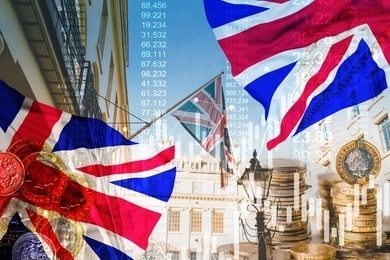UK Economic Crisis, Bank of England, UK Inflation Rate
What are the British buying cheap and frozen foods?
What do forecasts by the Bank of England indicate about the economic situation in the coming months?
What is the rate of inflation in UK?
With the cost of living crisis in the UK, what measures have the British taken to reduce their costs?
The Bank of England (BoE) has warned that the country’s economic outlook has worsened since the start of the year and urged lenders to set aside more capital to absorb shocks in markets.
Difficult Economic Situation for the UK in the Coming Months
The UK economic crisis is rapidly expanding. The Bank of England wrote in its “Financial Stability” report: “The economic outlook for the UK and globally has deteriorated materially.” The report states: “Prices of essential goods such as food and energy have risen sharply in the UK and globally, and the outlook for growth has worsened.” This is largely a result of Russia’s illegal invasion of Ukraine, according to the statement. The Bank of England added: “Given this, we expect households and businesses to become more stretched over the coming months. They will also be more vulnerable to further shocks.”
Double Digit Inflation Rates in the UK
The UK economic crisis is being followed by many financial institutions and economic experts. Despite the worsening cost-of-living crisis and double-digit inflation, the watchdog expressed confidence that banks are resilient to debt vulnerabilities among households and businesses. The BoE has also asked banks to increase their capital with the organisation by 2%, meaning they would need $13.2 billion in additional cash. The bank said: “The outlook is subject to considerable uncertainty and there are a number of downside risks that could adversely affect UK financial stability.” Economists warn that inflation in the UK is expected to reach 11% later this year and the central bank’s benchmark interest rate will rise to 3% by the end of 2023.
More Economic Pressure on British Families
The governor of the Bank of England has warned that the energy crisis will last longer and put more pressure on British families. It seems that the UK economic crisis affects all aspects of British life. Bloomberg, quoting Andrew Bailey, wrote: “Unfortunately, there is going to be a further step-up in UK inflation later this year because that’s a product of the way the energy price cap interacts with the energy prices we have observed over the last few months.” “The structural legacy” left by Covid-19 in the labour market has had a stronger impact in the UK as companies struggle with labour shortages, Bailey told a European Central Bank (ECB) conference in Sintra, Portugal. He explained that in the latest inflation statistics for his country, he has seen a change in the reasons for the increase in inflation. The rise in inflation due to the drop in the supply of goods in the post-Covid era has changed to the impact of the war in Ukraine on the services and goods sector.
Brits Buying Cheap and Frozen Foods
According to data published by government sources, the rise in inflation reached 9.1% in May, which has been unprecedented in the last 40 years. The increase in prices in the UK has caused the people of this country to buy frozen and cheap foods, provoking protests at the same time. The manager of Sainsbury’s online retail store in the UK reports that shopping lists have shortened among most segments of society and many customers have turned to buying frozen and cheaper foods. Simon Roberts, the retailer’s chief executive, says that customers of this store are forced to reduce their living expenses by buying frozen foods due to rising prices and inflation in the country. This sales manager says that most customers are unable to buy food because of high prices and that they only visit online. Roberts said in a conversation with Reuters: “In many ways there is no playbook for what we’re dealing with at the moment: these are unprecedented circumstances.”
British Tendency to Buy Frozen Chicken
The UK economic crisis has forced many Britons to change their lifestyle. The market researcher NielsenIQ has published a strange report on the tendency of people to buy frozen chicken, which shows that the sale of frozen chicken and meat has increased by 12% in the last few weeks. Other cheaper products have also gained popularity among shoppers in recent weeks, the NielsenIQ’s report shows. Food sales have fallen 5.5% since mid-June, the institute said, as shoppers continue to rein in their spending.
To deal with inflation, the Bank of England needed the option to raise interest rates by half a point. The bank has increased the interest rate five times since last December. With the release of new inflation figures, European Central Bank (ECB) President Christine Lagarde said the bank is using a two-pronged approach to respond to economic uncertainty. Russia’s war in Ukraine has led to a spike in energy and food prices that are much higher than in the 1970s and 1980s. Due to its dependence on energy, the Eurozone experiences these shocks strongly; the size and complexity of these shocks also creates uncertainty that the inflation will continue to persist.

